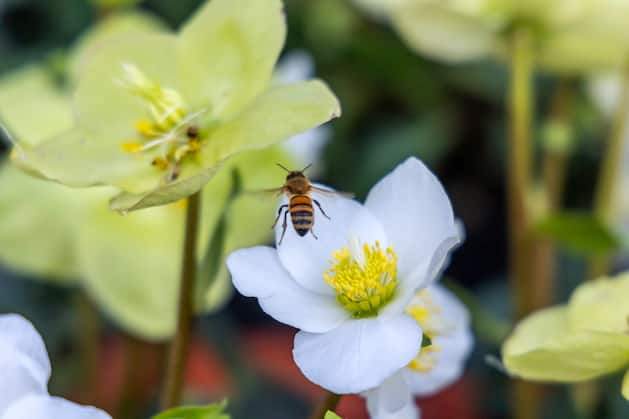No snow, but unusually high temperatures. This is winter 2022/23. The mild weather poses problems for insects. But how big are the challenges for bees in particular? An expert explains.
Have you ever observed bees in the garden? Strange, isn’t it? So early this year! And don’t they hibernate? “It is a common misconception that all bees hibernate,” explains Melanie von Orlow to FOCUS online. The doctor of biology is a bee expert at Nabu Berlin and a beekeeper herself.
Honey bees are particularly active in winter. “They heat their winter cluster by contracting their flight muscles all the time,” says the expert. “The colder it is, the tighter the winter clusters.”
But given the warm outside temperatures, more and more workers are leaving the hive to start looking for food. Melanie von Orlow: “The bees can fly out at eight degrees Celsius and sunshine. This used to be the absolute exception in January, but today, due to climate change, it is becoming more and more common.” Honey bees also have a good sense of time and also recognize when the days are slowly getting longer again.
“Already after Christmas, the queen bee starts with the brood business in the heart of the winter cluster,” reports von Orlow. And they want to be fed. “Bees are now primarily looking for water, which they need to absorb the stored pollen supply,” emphasizes the expert. “And the bees also collect the first pollen, such as hazel or Christmas rose, where available.”
In contrast to many wild bee species, which depend on certain flowers, honey bees fly to everything that is in bloom. “The honey bee is very flexible,” says von Orlow. “But most of the plants aren’t blooming yet, although the bees are already on the move due to the mild temperatures.”
But nobody has to worry about the bees. On the contrary: “Occasional sunny days are not bad at all, because the bees can also carry out cleaning flights,” explains von Orlow. “That means they empty their bowels. These are the yellow speckles that you sometimes discover on the terrace.” This is very important for the health of the bee colony. “If the bees defecate in the hive, it can lead to fatal diseases for the entire colony.”
The warm temperatures do not harm the bees. “Frequent changes from relatively mild to ice-cold, long-lasting cold periods are treacherous,” says the bee expert. “Bees are at risk of starving because they have to warm their brood and can no longer access distant food stores.” This has consequences. “Sometimes they also sacrifice their brood, eat them up.”
Melanie von Orlow therefore makes it clear: “Bees don’t starve when it’s permanently cold in winter, but when it gets warm and the exhausting breeding business begins.” Many hobby gardeners therefore ask themselves how can I help? “The best support for bees is a bee-friendly garden design, preferably with Christmas roses, elf crocuses, willows and everything that blooms early.” Melanie von Orlow appeals to refrain from thuja, forsythia and the like.
But above all: “Do not create any feeding stations in the garden and under no circumstances provide honey for the bees.” Products from non-EU countries, for example, pose a risk of American foulbrood spreading through spores in the colonies. That would have devastating consequences.















